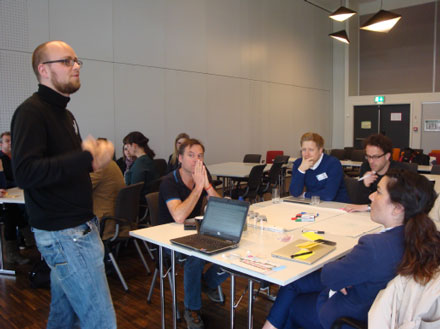 On Thursday 10th April 2014, the Grassroots Innovations project organised a half-day World Café workshop in Copenhagen on the topic of grassroots fabrication in makerspaces. It formed one session within a wider conference exploring an 'Innovative Civil Society' and hosted by the international Living Knowledge network of science shops.
On Thursday 10th April 2014, the Grassroots Innovations project organised a half-day World Café workshop in Copenhagen on the topic of grassroots fabrication in makerspaces. It formed one session within a wider conference exploring an 'Innovative Civil Society' and hosted by the international Living Knowledge network of science shops.Makerspaces are one of the case studies in our project Grassroots Innovation: historical and comparative perspectives, led by STEPS researcher Adrian Smith.
Research Briefing 23 (pdf) provides a summary report of participant discussions from that session. Over 30 participants with varied experiences of makerspaces contributed to the discussion. Importantly, before discussions got underway, practitioners from three local makerspaces gave presentations: Vanessa Carpenter from Illutron Collaborative Interactive Art Studio in Copenhagen; Michael Hviid Nielsen from Copenhagen FabLab; and Oyuki Matsumoto from STPLN Open House Makerspace in Malmö.
From the Grassroots Innovations website:
"As designers and social scientists, we see FabLabs, Hackerspaces and other makerspaces as sites where people are experimenting with grassroots digital fabrication in a wide variety of forms, and where reflections by practitioners provide valuable insights to our developing understanding of making and consuming. We wanted to explore some of the claims being made for these spaces with a mix of practitioners and researchers with either direct experience with makerspaces, or related experience with contrasting sites of public engagement in knowledge production and material experimentation, such as science shops. So we invited the presentations and discussions to consider issues of creativity, inclusion and sustainability in makerspaces.
The key message from the World Café, in our view, is that providing facilities, tools, and even technical assistance and training is only one aspect to creating a makerspace. Establishing the culture within and its position in the world is what makes the space. In doing that, there are complex interactions between the people and things involved, and also between the space and the wider social and material world. Were makerspace managers and supporters to choose to pursue goals for creativity, inclusion and sustainability, then they will need to attend to those internal and external social and material relationships, and the deeper and broader forces that underpin and shape those relationships. As such, the ways makerspaces might contribute to goals of creativity, inclusion and sustainability, will depend upon their material cultures and the political economies that frame and shape making possibilities."
- Download the briefing: Research Briefing 23 (pdf) by Adrian Smith and Sabine Hielscher (SPRU), Sascha Dickel (Technical University Munich), Ellen van Oost (University of Twente), Johan Søderberg (IFRIS)
